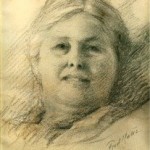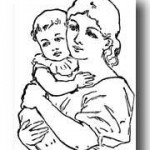
Interest in Charlotte Mason’s educational approach has exploded within the homeschooling community in the last 15 years. We seem to love the idea of picture studies, narrations, and pretty books of centuries. We recognize the respect Mason extended to children, and this feels right to us. But there is more to it than that.
What exactly does it mean to educate our children following Charlotte Mason’s ideas about learning? What is a Charlotte Mason education? This post serves as the first in a 3-part series of articles on:
- The starting point of Mason’s educational philosophy,
- The principles upon which her method is based, and
- The key features of her method as practically applied.
I’ll be frank. In order to really enjoy and understand Charlotte Mason’s philosophy, you must take a long, leisurely country drive through it. My 3-part series of posts will be more like a blur in the last stretch of the Grand Prix! Sometimes, though, brevity can suit our purposes.
If you are very curious about Charlotte Mason’s educational approach, then I hope you’ll continue your investigations by reading one or more of the published books that clarify some of the specifics of Charlotte Mason’s ideas and approach. By reading a more comprehensive book about Mason and her method, you’ll have a much clearer understanding of what you are meant to do and why you are doing it.
My personal favorites of the many terrific books available:
- For the Children’s Sake, by Susan Schaeffer Macauley (Inspirational; after reading this book you’ll feel you’ve stumbled upon something important.)
- When Children Love to Learn, edited by Elaine Cooper (An erudite collection of essays. This book was a turning point in my getting the “big picture” of Mason’s theory. The intended audience is the professional classroom teacher, but homeschoolers have also found this book very helpful.)
- Real Learning: Education in the Heart of My Home, by Elizabeth Foss (Written by a Catholic homeschooling mom; Foss is unattached to any particular philosophy and clearly seeks the truth in whatever approach she uses to guide her children; excellent chapter on avoiding burnout.)
- A Charlotte Mason Education and More Charlotte Mason Education, by Catherine Levison (This homeschooling mom has lived the Charlotte Mason life. She knows her stuff. Her little books cover the various subjects very succinctly. Very good on anwering your “what” and “how” questions but the above books are stronger on answering “why” questions.)
 Part 1 of 3: CHILDREN ARE BORN PERSONS (Mason’s Starting Point)
Part 1 of 3: CHILDREN ARE BORN PERSONS (Mason’s Starting Point)
Charlotte Mason lived during the waning years of the Victorian era, but she was no typical Victorian lady. Her method was revolutionary partly because it begins with a philosophical starting point that was counter-cultural in her day: children are born persons and deserve to be treated with same respect as all persons. She writes, “The fact seems to be that children are like ourselves, not because they have become so, but because they are born so.” A Philosophy of Education, 46 (emphasis mine).
Children bear the divine image of God; they are capable of expressing and reflecting Godly attributes. Children are thus born whole persons, and not formless lumps that need molding in order to become valuable. Like all human beings, they have a natural yearning for God and a natural desire for knowledge. This is no accident. This hunger is God’s very image present in the soul of every human — present from birth– calling us out of ourselves to seek Him, to seek Truth and Beauty.
We cannot, then, deny the dignity of the child, a dignity that must be protected no matter the child’s intellectual abilities or socio-economic status. When we attempt to pour information into a child as if he were an empty pot that needs filling, we violate that dignity. When we crassly overemphasize achievement, grades, and educational outcome, we violate that dignity. Because of their divine birthright, children don’t have to do anything or become anything to be complete. Children deserve to be respected for who they are, not for what or who they could potentially become.
From this starting point — that children are born persons because they reflect the image of God — the rest of Mason’s educational theory flows effortlessly. Narration is not the starting point. Short lessons are not the starting point. Living books are not the starting point. Children are born persons: this is the starting point. Realizing this was a turning point in my understanding what Charlotte was up to nearly a century ago in the English countryside.
Author Jack Beckman explains that Mason’s starting point reveals her assumptions about the nature of the learner. See Jack Beckman, “The Child Is a Person” in When Children Love to Learn, 58-61. Any teacher’s or parent’s view of or assumptions about the learner affects how she answers questions about why she is teaching and what should be taught. I doubt many teachers really examine their assumptions about their students, but those assumptions drive their choices, attitudes, and feelings every day.
If the teacher believes the learner is incomplete (or even defective) or needs to be molded into the teacher’s own image, she will answer these questions one way. If the teacher believes the learner just needs to filled up with the right facts, she answers these questions in another way.
If the teacher, like Charlotte Mason, sees the child full of “vast potential” (though limited by “ignorance and inexperience”), she will quite naturally see that they deserve the freedom to feast on the best “mind food” balanced with the loving encouragement they need to accept their responsibility to others, to God, and to themselves. The child should be an active participant in his own learning, rather than a passive recipient of information poured into him from his betters.
Now that we have a handle on the starting point of Mason’s philosophy, in Part 2 we will move on to the foundational principles of her philosophy, which is summed up nicely in her motto: Education is an atmosphere, a discipline, and a life.